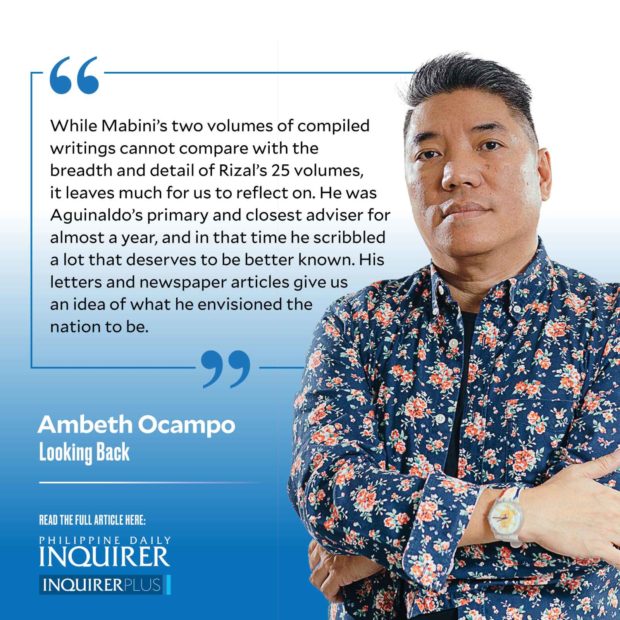Mabini: Conscience of the nation

We should reclaim Mabini as a hero for our cynical times, as someone who shows us what it is to live and die for what is right.
Officially, today is Mabini’s 157th birth anniversary; the date July 23, 1864 was supplied by the Sublime Paralytic himself. However, Teodoro Agoncillo warns us against confusing Mabini’s baptismal certificate for a birth certificate. Mabini was baptized on July 23, 1864, feast of San Apolinario, but the officiating priest noted that the child was a day old. That Mabini was born on July 22, 1864 does not really matter, because he entered history on June 12, 1898. However, except for an Ayala Museum diorama, Mabini is absent from all representations of Independence Day.
Article continues after this advertisementWhen Emilio Aguinaldo returned to the Philippines on board a US ship and announced the continuation of the Philippine revolution against Spain, he sent for a Batangas lawyer famous for an “ulong ginto” (head of gold). Carried from Batangas to Laguna in a hammock, Mabini endured all discomforts patiently, even when he was abruptly dropped on the ground to be picked up by the next relay. He arrived in Kawit in time for the declaration of Philippine independence, the waving of the Philippine flag, and the premiere of the Magdalo March that became our national anthem.
Skipping pleasantries when introduced to Aguinaldo, he asked if the Americans had committed to help Filipinos gain independence from Spain in writing. Aguinaldo had no such commitment. Mabini then ruined the festive mood by saying that the declaration of independence was premature. He criticized the wordy document and its statement that the colors of our flag mirrored those of the US. Worse, the document stated that we owed Philippine independence to the grace of “The Great North American Nation.” That afternoon, Mabini made his first political enemy by replacing Ambrosio Rianzares Bautista, author of the declaration of independence, as Aguinaldo’s principal adviser.
Months later, when Aguinaldo submitted Mabini’s appointment as [President] Chief Justice of the Supreme Court to the Malolos Congress for confirmation, Rianzares Bautista seized the chance for revenge by exposing Mabini’s physical disability in a newspaper article. Writing under the thinly disguised pseudonym “Zerzarian,“ he asked: “How can a man without feet be appointed or elected to such high office?”
Article continues after this advertisementTo which Mabini replied: “Does the job of Chief Justice of the Supreme Court require constant walking? No? Therefore, he can be a man without feet, as long as he possesses the brains and able hands for the office.” Not content with that, Mabini gave the dagger a few twists before pulling it out. In an open letter to “Zerzarian,” Mabini, writing under the pseudonym “Paralitico,” said: “Being assured that old age produces in definite persons a sickness at least as inconvenient as paralysis, I shall not bear you any grudges.”
While Mabini’s two volumes of compiled writings cannot compare with the breadth and detail of Rizal’s 25 volumes, they leave much for us to reflect on. He was Aguinaldo’s primary and closest adviser for almost a year, and in that time, he scribbled a lot that deserves to be better known. His letters and newspaper articles give us an idea of what he envisioned the nation to be. His small marginal notes on all papers that required Aguinaldo’s attention or signature provide an insight into the challenges of government and how he resolved them.
All these small notes are scattered in papers waiting to be mined in the National Library of the Philippines and the Library of Congress in Washington, DC. It is not well known that Mabini drafted a constitution that was ignored by his enemies in the all-male Malolos Congress, who did not look kindly on a provision that gave women the right to education and the right to vote. As a licensed teacher, Mabini knew that education was an investment in the future, so he drafted a decree that established a stillborn Universidad Literaria de Filipinas.
Rizal imagined a nation before it was born. Mabini was the conscience of the First, the Malolos Republic.
Comments are welcome at aocampo@ateneo.edu
















